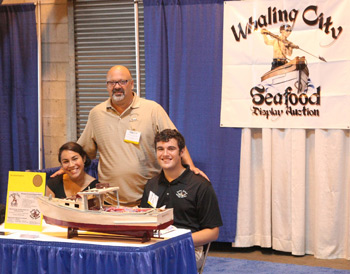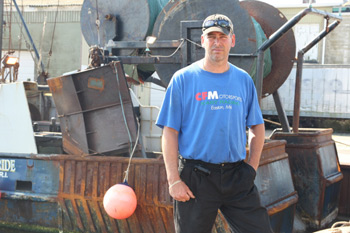FISHERMEN ON FISHING
Richard Canastra – Whaling City Seafood Display Auction
by Sam Murfitt

Richie Canastra, Whaling City Seafood Auction, with his daughter and son, at the Commercial Marine Expo in New Bedford, June 2010. ©Photo by Sam Murfitt
“In New Bedford, we have lost 65 percent of our capacity. I think that’s an effect of catch shares. The boats just did not get enough fish with this allocation process to make fishing profitable. The allocation process was unfair. It favored special interests in the industry so that it’s just not feasible or economical for the boats to go out fishing.
We can prove National Marine Fisheries Service (NMFS) wrong Take what happened with Pollock, when they came back and said that we are 500 percent off. The industry thinks it’s a big win and personally, I just think it shows how screwed up they are, how screwed up the assessments are. We definitely need a wide range assessment on all the stocks, but I don’t think we are going to see that until NMFS gets to their final objective of reducing the capacity of the fleet. Most of the boats that did go out skate wing fishing, sold their allocation, at least their allocation for the year, because it wasn’t feasible for them to fish.
If you have a 50-70 foot dragger, it costs $50,000 for insurance to go fishing and $11,000 to be tied up at the dock so it just made sense for them tie up at the dock, sell their allocation, sit back for a year and hope that government officials will come in and straighten out this mess.
You know, there are a few winners in this catch share program. The winners are the guys that were prepared for it, the guys who could foresee the future. They bought permits in the past only to lease those days at sea for those permits. Now they have the history from all those permits and it seems like they are doing okay. But the Plan Development Team (PDT) is running a white paper now to put a capacity cap on these companies that geared themselves up to see what was forecast. Again, it’s that “ready, fire, aim” management. They give you a plan to go on and now they are going to come back and stop the capacity. Where does it end, how does it end?
As far as the auction itself, we have been up in landings for May and June. July has been down about 20-25 percent so far. The reason for the increase in sales with this catch share system, is that we have picked up a lot of vessels out of New York and Point Judith, RI that are coming into New Bedford to sell their fish. But other than that, there are species that we are down on. For example, grey sole is down about 50,000 pounds compared to last year; sea bass is down over 50,000 pounds; yellow tail down over 100,000 pounds; monks 60,000 pounds; skate wings down 70,000 pounds, and I really foresee that this will continue to the end of the year.
Hopefully, Barney Frank wanted to see Lubchenko get boosted out of her position because, personally, I feel she is incapable of holding that position. But he backed down from it and there was some type of, I can’t say deal, but an understanding with the White House. They are going to take care of the industry by the end of July. Personally, I think it should be now. We just hope that the plan is going to help out the industry significantly.
If they are still banking on that pollock, they might as well forget about it, because if someone was allocated 1000 pounds and they are 500 percent off, that means they get 5000 pounds so it really doesn’t make a big difference for anyone that doesn’t have a good history of landings of pollock. All that really does is show how incompetent they are on their stock assessments being 500 percent off. So, we will see how the year goes. I know some boats are shut down for the year. Again, here in New Bedford, we have lost 65 percent of the fleet, most of them just being tied up because it is just not profitable for them to go fishing.” – Richie Canastra
Paul Weckesser — Scalloper/Welder
by Sam Murfitt

Paul Weckesser has fished in Alaska, scalloped on the east coast and has a marine welding business in New Bedford, MA where he owns three scallop boats. ©Photo by Sam Murfitt
“Between the catch shares and the stacking that is coming up, as a shore side business, we’ve seen it go from over 30 employees down to six. Catch shares have been no good. Policing that was a dragon and was no good for the shore side businesses and no good for the fish. The permit stacking on the scalloping is going to kill the industry. It’s been bad for the shore side businesses, it’s going to be bad for the fishermen and it’s going to be bad for the scallops. When I fished in Alaska, the same thing happened there. We see same thing happening here with the draggers and we are going to see it happen with the scallopers, too. It’s just not going to be good. It hasn’t worked anywhere and its not going to work with scallops.
We are working. The scallop boats are making money. The scallop industry is thriving and there’s no reason to change it. It’s the National Marine Fisheries Service that is looking at changing this. And it’s based on a minority of a half a dozen vessel owners, big fleets, that want to become more vertically integrated where they won’t be using the local businesses in town. They will have everything under the same roof, just as what I saw happen firsthand in Alaska. It’s going to be bad for the local economy. It’s going to put hundreds of people out of work in the New Bedford area alone.” – Paul Weckesser
